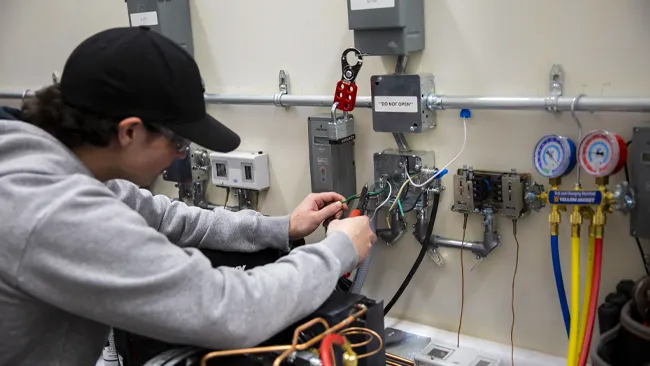
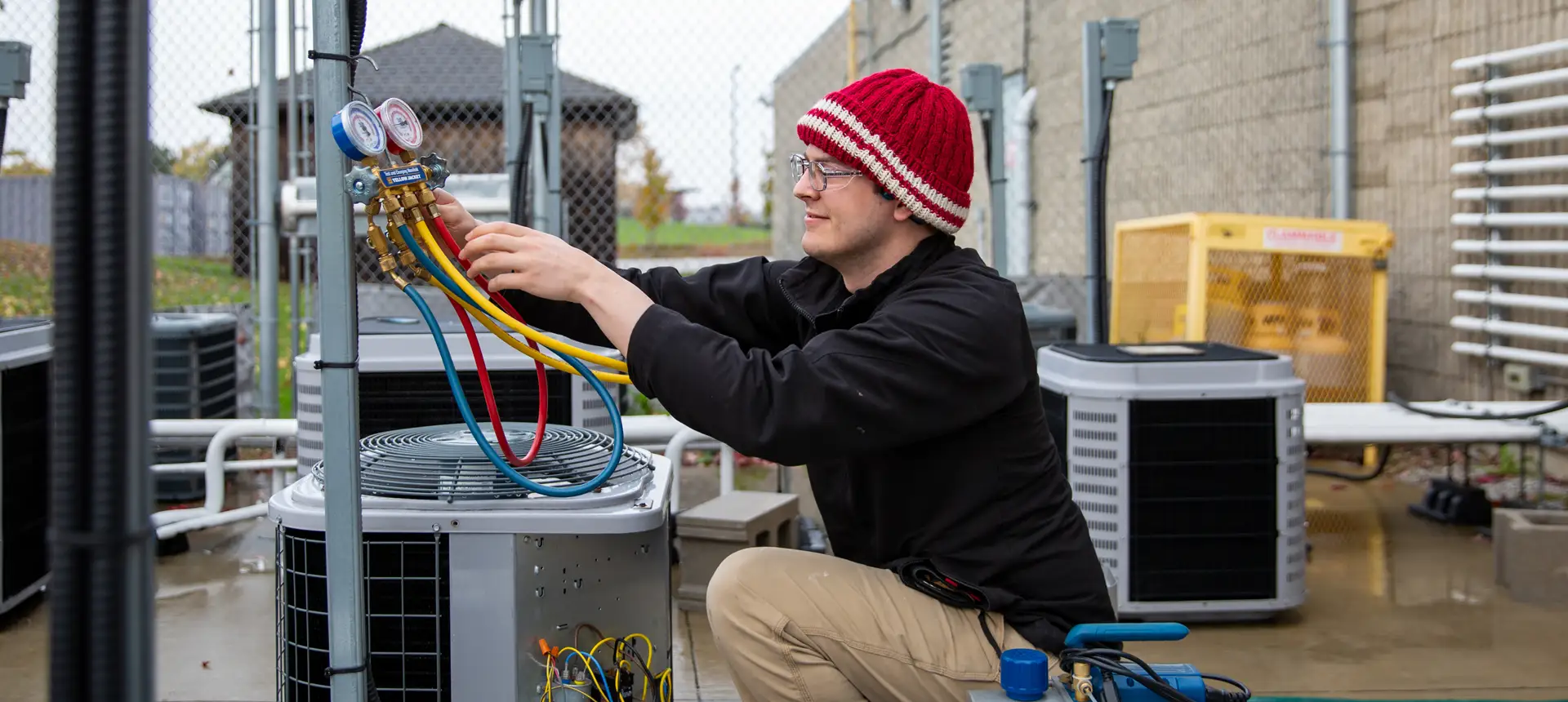
Heating, Refrigeration & Air Conditioning Technician
CIP Code: 47.0201
Overview
Develop the technical skills and knowledge required to work in the growing HVAC field. Study electricity, refrigeration, and HVAC system design and prepare for success.
An HVAC technician, also known as a heating, ventilation, and air conditioning technician, is a skilled professional responsible for installing, repairing, and maintaining HVAC systems. They work in a variety of settings, including residential homes, commercial buildings, and industrial facilities.
HVAC technicians use their knowledge of mechanical, electrical, and plumbing systems to diagnose and solve problems related to heating, cooling, and ventilation. They must also stay up to date on the latest industry standards and regulations to ensure that they are compliant with ever changing technology and regulations.
Additionally, in a world where energy efficiency is paramount, HVAC Technicians need to be taught, and continue educating themselves on new and sustainable technologies into their careers.
Hands-on Learning Opportunities
Admission Requirements
O.S.S.D. or equivalent with:
- Grade 12 English C or U
- Grade 11 or 12 Mathematics C or U
Grade 12 Mathematics Requirement
Grade 12 Mathematics for College Technology or any grade 12U mathematics is recommended; Grade 12 Foundations for College Mathematics (MAP4C) minimum final grade is 60%. If the program is highly competitive, students with Grade 12 Mathematics for College Technology or any Grade 12U mathematics will be given preference.
The admissions process is competitive and meeting the minimum academic requirements does not guarantee admission.
Lambton College reserves the right to alter information including admission requirements and to cancel a program or course at any time; to change the program curriculum as necessary to meet current competencies or changes in the job market; to change the pathways to third-party certification bodies; or to withdraw an offer of admission both prior to and after its acceptance by an applicant or student because of insufficient applications or registrations or over-acceptance of offers of admission. In the event Lambton College exercises such a right, Lambton College's sole liability will be the return of monies paid by the applicant or student to Lambton College.English Language Requirements
International applicants must demonstrate their knowledge and skills in English by submitting an English proficiency test. Please refer to our English Language Requirements webpage to determine which minimum scores are accepted.
Meeting the minimum English requirements does not guarantee admission. Students with higher English proficiency scores will receive priority in the admission assessment process. Not all students will qualify for EAP-3106 in place of the required IELTS or TOEFL test scores.
Testing & Certifications
Before working as a Gas Technician in Ontario, there are certain requirements that must be met. Lambton College's HVAC program follows the curriculum for students to attempt the Gas Technician 3 and Gas Technician 2 certifications.
Other certification students will be able to obtain include:
- Ozone Depletion Prevention Certification
- Gastite Gas Tubing Certification
- Wardflex Gas Tubing Certification
- IPEX System S636 Venting Certification
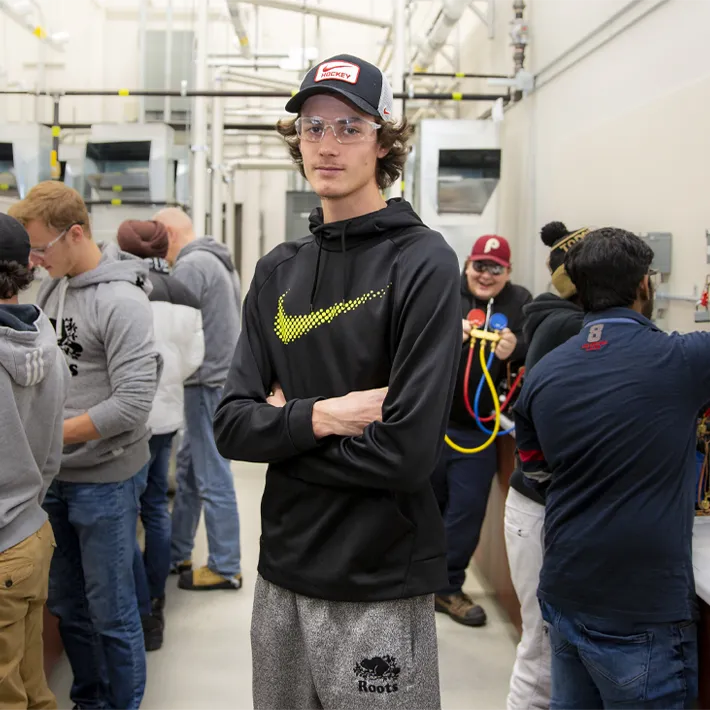
Costs
- Term $8,003.48
- Term 2 $7,213.45
- Co-op Term $0.00
- Term 4 $7,913.45
- Term 5 $7,213.45
Total Cost of Program
Tuition fees are estimates and are subject to change each academic year. Fees do not include books (unless specifically noted), supplies or living costs.
Lambton College reserves the right to alter information including admission requirements and to cancel at any time a program or course; to change the location and/or term in which a program or course is offered; to change the program curriculum as necessary to meet current competencies or changes in the job market; to change the pathways third-party certification bodies; or to withdraw an offer of admission both prior to and after its acceptance by an applicant or student because of insufficient applications or registrations or over-acceptance of offers of admission. In the event Lambton College exercises such a right, Lambton College’s sole liability will be the return of monies paid by the applicant or student to Lambton College.
Technology Requirements
In order to keep pace with the requirements of each and every course in your program, Lambton College requires that each student have access to a laptop while studying at our college.
Courses
Fundamentals of Refrigeration
A theoretical and practical introduction to the fundamental principles of Refrigeration, Heating and Air Conditioning systems is provided. Students are introduced to government codes and regulations regarding the industry and to the principles of various systems operation's and installation. Safety requirements, use and selection of various tools, instruments and fasteners are also studied in both theory and lab environments. The fundamental principles required to plan and install different types of piping for a variety of refrigeration, air conditioning and heating systems are also covered.
Gas Technician 3 - Codes & Work Practices
Students will learn hazards and safety procedures that relate to working conditions, and the safe handling and procedures for materials they will be using. Students will be introduced to common fasteners, hand and power tools used in the HRAC field. Students will study the origin and properties of natural gas and propane, identify the characteristics of complete and incomplete combustion, upper and lower explosive limits, potential sources of ignition, carbon monoxide and other by-products of incomplete combustion. In addition, students will examine the natural gas and propane installation codes and code adoption documents, Ontario regulations, and standards associated with the manufacturing, testing, installation, and servicing of natural gas and propane appliances, components, and equipment.
Gas Technician 3 - Electrical, Piping & Venting Systems
This course introduces the student basic electrical properties, safely operating, and interpreting electrical meter readings to diagnose equipment operation. Students will learn to read blueprints and obtain information from job documents and equipment manufacturer's installation instructions. Students will discover industry accepted customer service expectations and communication. Gas piping and tubing installation, codes and calculating capacity of fuel are instructed. Introduction to common appliances and their systems (venting, burners, safety and operating controls) will also be taught. More than half of this courses content include practical lab assignments which solidify the theoretical concepts taught.
Health & Safety
The graduate of this course will have a good understanding of safety aspects of the law, the legal responsibilities of the workplace, and his/her own legal rights and responsibilities, as well as work processes and procedures being used in present-day industry. This course will give them a basic understanding of the Occupational Health and Safety Act and its associated Regulations, and an understanding of health and safety issues in an industrial setting.
Applied Mathematics
Job Search & Success
This course provides student with skills and knowledge to help support their career search and succeed in the workplace. Students align their personal skill set and goals to guide them on their career paths. They will learn how to effectively conduct a job search, build a professional and well-tailored resume and cover letter, and develop and practice interview techniques. Students will also develop their personal brand to help support effective career networking and aid in their job search. Teamwork and collaboration in the workplace are also discussed. Self-reflection is used to inspire insight and support their professional career journey.
Fundamental of Refrigeration II
Students will apply the fundamentals of refrigeration to practical applications and design and build refrigeration systems. Students learn proper refrigerant recovery, industry accepted evacuation standards, proper selection of refrigerant, and charging of refrigerant. Students expand their understanding of environmental and regulatory rules related to the safe handling of refrigeration equipment and materials.
Safety & Material Handling
Students will be introduced to various safety work related topics in the HVAC field such as: WHIMIS, Transportation of Dangerous Goods, Ozone Depletion Awareness, Vehicle safety, working at heights, ladder and scaffold safety.
Gas Technician 2 - Advanced Piping, Building Systems & Appliances
This course examines gas piping requirements for industrial and commercial propane and natural high-pressure gas systems. Piping layout, drawings, symbols, joining methods, identification of underground piping and pressure testing are studied. Domestic gas appliance service and installation are also instructed. Common types of construction methods used in the building industry today help the student understand the concept of a building as a series of interdependent parts. Students will learn about air distribution systems, and air system balancing. Principles of heat loss and gain are also studied. Many practical lab exercises reinforce theoretical concepts taught in this course.
Gas Technician 2 - Electricity & Controls
Technicians must understand how electrical power operates in systems, and how to properly and safely diagnose electricity and electrical components within various appliance systems. This course examines amperage service, ground fault circuit interrupters (GFCI), electrical bonding to gas piping, single-phase and three-phase power supply, electrical hardware, types and ratings of fuses and breakers as well as types and gauges of wire, thermocouple and power pile DC millivolt systems. In addition, it focuses on appliance wiring, schematic diagram design and interpretation. Using furnace simulation boards and gas-fired furnaces, students will design and draw schematic and wiring diagrams for natural draft, fan-assisted and high-efficiency furnaces. Students will then learn to wire and troubleshoot operational faults. This course also covers control concepts and components associated with gas fired appliances including: the basic control system, operating controllers, limit and safety controllers, combustion and safety controls, ignition control modules, valves, regulators and motors. Numerous practical lab projects assist in reinforcing the theoretical concepts.
General Education Elective
Co-op Work Term (optional)
Co-operative education provides students with the opportunity to apply classroom learning to the workplace, undertake career sampling and gain valuable work experience that may assist students in leveraging employment after graduation.
Fundamentals of Refrigeration III
This hands-on course provides introductory training to install, service, maintain and update refrigeration systems, select appropriate types of condensers, evaporators, compressors, refrigerants and flow controls. Students also learn joining and connection operations that conform to industry code, proper use of recovery equipment, troubleshooting refrigerant problems, and the use of electronic scales for charging.
Gas Technician 2 - Gas Pressure Controls & Gas-Fired Refrigeration
A thorough understanding of the principle elements of gas pressure regulators and their operation is necessary in order to properly install and service gas equipment. This course explores the need for pressure regulators, examines the code and regulation requirements, explains the basic operation of a regulator, compares different types of regulators, regulator selection requirements, and troubleshooting common regulator problems. Introduction to gas fired refrigerators is also covered in this program. Many practical lab exercises reinforce theoretical concepts taught in this course.
Gas Technician 2 - Conversion Burners, Water Heaters & Combination Systems
Students will learn about conversion from one type of fuel source to another on different appliances encountered in the industry. Combustion characteristics and adjustments of gas burner systems is covered in depth in this program. Installation of new and replacement gas water heaters are normal duties of a gas technician. The student will learn types of heater controls, components, and piping systems and how these systems are successfully planned and installed. Tankless water heater installation and service will also be covered in this course. Many practical lab exercises reinforce theoretical concepts taught in this course.
Gas Technician 2 - Forced Air Systems
Gas technicians need to understand the operational aspects of forced warm-air furnaces in order to provide effective, efficient, and safe service to their customers. Students will learn how to install, maintain, service, and troubleshoot forced warm air systems. Areas of study include venting systems of furnaces, drain systems, sheet metal design, layout, fabrication and installation, 120- and 24-volt furnace electrical systems and gas piping and tubing supply systems. Many practical lab exercises reinforce theoretical concepts taught in this course.
Workplace Communications
In this course, students write and speak in response to realistic workplace scenarios to build practical communication skills. They produce, revise, and edit written communication geared to the workplace and practice the oral communication and effective listening skills that will help them succeed in professional environments.
General Education Elective
HVAC Building Automation
Technicians frequently encounter problems with building automation systems and are required to diagnose, repair and maintain simple and complex automation systems. Students will gain a greater understanding of building mechanical systems, automated systems, and controls and be able to describe and diagnose faults. Smart thermostat programming and diagnosing is also taught in this course. Practical lab exercises reinforce theoretical concepts taught in this course.
Gas Technician 2 - Hydronic Systems & Venting II
Students will learn the concepts of water used as a heating medium, the differences between hydronic and forced air heating systems. Pump selection and troubleshooting, boiler controls and boiler troubleshooting, boiler service and maintenance are also covered in this course. Venting systems, the material, application and proper sizing of venting systems used on appliances is also covered. Practical lab exercises reinforce theoretical concepts taught in this course.
Gas Technician 2 - Air Handling, Space Heaters & Appliances
Students will learn concepts of air movements in ductwork and different areas of buildings. Adjusting airflow through appliances and utilizing filtration systems to achieve proper air exchange and maintain air quality. Air movement device selection and maintenance are also covered in this course. Options for building heating can utilize different types of space heating appliances for smaller areas or smaller rooms of the home or garage. Add-on devices such as filters, air cleaners, humidifiers, and cooling coils improve the air quality in a building heated by a forced-air furnace. Students will learn how to select, install and maintain filters, humidifiers, air cleaners, and add-on heating and cooling coils. Practical lab exercises reinforce theoretical concepts taught in this course.
General Education Elective
Contact
Centre for Global Engagement
LAMBTON COLLEGE SARNIA
1457 London Road
Sarnia ON N7S 6K4
After Graduation
Employment Opportunities
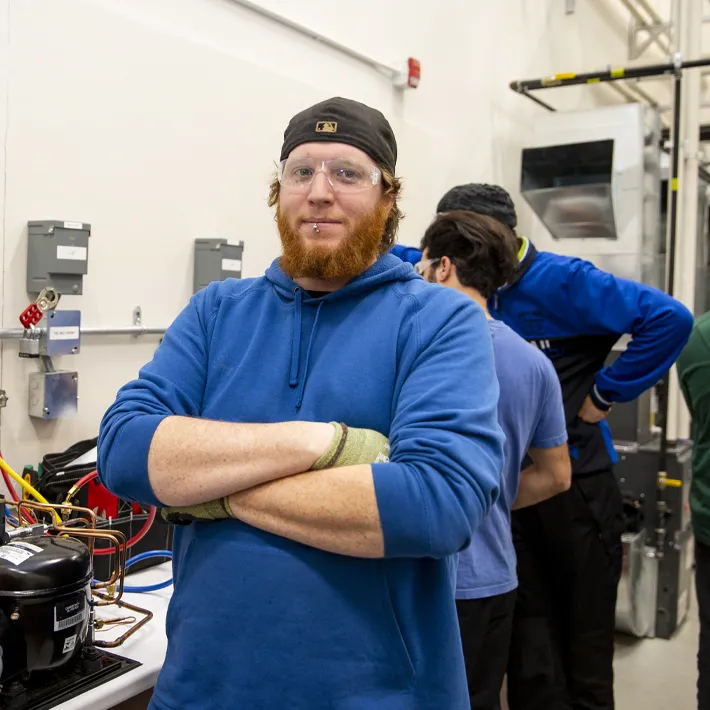
Apprenticeship possibilities and job prospects are excellent, with above average wages and steady employment. Graduates find work in heating, air conditioning, sheet metal, electrical and refrigeration contracting firms. Other opportunities include petrochemical, building and facilities services, wholesale, distribution, parts and equipment manufacturing companies.
Career positions may include, but are not limited to: central air conditioning mechanic, commercial air conditioning mechanic, heating and cooling mechanic, commercial air conditioning mechanic, heating and cooling mechanic, heating, ventilation and air conditioning (HVAC) mechanic, refrigeration and air conditioning mechanic apprentice.
Pathways
Build on your education and complete a college diploma or university degree in Ontario, Canada, or abroad
Want to see more Ontario transfers? Visit ONTransfer.ca.
Looking for Support After Graduation?
The International Graduate Services & Support Centre (GSSC) is a place dedicated to assisting International alumni as they seek employment and settle into Canadian life following graduation.
Post-Graduate Employment
International students who successfully complete their programs of study at Lambton College may be eligible to apply for a Post-Graduation Work Permit (PGWP) Program. This program allows students to gain valuable Canadian work experience.
A work permit under the PGWP may be issued for the length of the study program, up to a maximum of three years. A post-graduation work permit cannot be valid for longer than the student's study program, and the study program must be a minimum of eight months in length. The length and approval of the PGWP is determined solely by Immigration, Refugees and Citizenship Canada (IRCC).
Students must meet the eligibility requirements to apply for a post-graduation work permit.
Immigration Regulations & Changes
Immigration regulations are legislated by the Federal Government of Canada and are subject to change at any time without notice. Students are responsible for ensuring that they are in compliance with all Immigration, Refugees and Citizenship Canada regulations at all times during their studies and while in Canada. Lambton College staff are not authorized to provide advice or guidance on immigration-related matters. Prospective applicants and current students should consult the Immigration, Refugees and Citizenship Canada website or call the IRCC Call Centre at 1-888-242-2100 to answer or clarify any immigration-related questions or information.
Co-op
About Co-op
Students in this program have the opportunity to gain valuable work experience by applying classroom learning during co-op experiences.
Learn more about co-op terms and the roles and responsibilities of students and co-op advisors.
More Information
Empowering Women to Lead in Tech & Trades
Our Women in Technology & Trades (WiTT) is a vibrant community dedicated to empowering women to thrive in tech and trades. Through mentorship, industry connections, and skill-building programs, WiTT breaks down barriers and fosters an inclusive environment where women can confidently pursue their passions and careers.
Together, we’re shaping a diverse and dynamic future.
Learn more about WiTT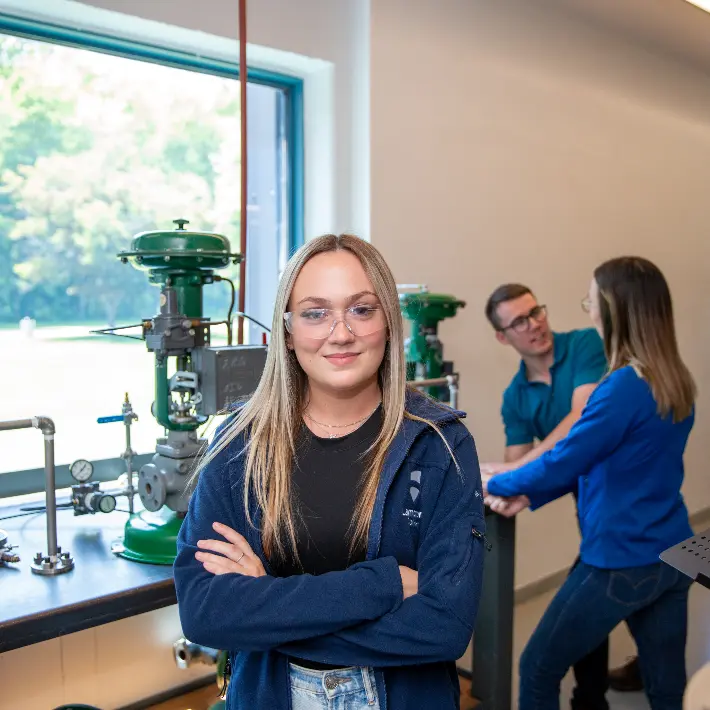
Student Responsibilities
- Course and program delivery schedules are proposed and subject to change for each intake.
- Students are required to bring their own laptop with wireless capability.
- Students are advised to bring an official copy of their most recent police clearance, driver's license, and vaccination record from their home country.

Technology Requirements
It is recommended that you use a Windows laptop for your coursework. While other devices like MacBooks or Chromebooks might work for some tasks, they may not support all the software required for your program. If you're unsure, check with your professors before buying.
Internet Speed Requirements
To get the best experience while learning online, we recommend having an internet connection with at least 40 Mbps download speed and 10 Mbps upload speed. This will help you use video calls, attend online lectures, and access other learning tools smoothly.
Because students live in many different areas, we can't suggest a specific internet provider. You'll need to check with local companies to find one that works best for you.
Laptop Requirements
In order to access the internet and virtually-delivered software and courseware, student laptops should include the following at a minimum. By meeting the following specifications, students will be equipped to access software and courseware on their laptop through the internet:
- Intel i5 8th Gen Processor or equivalent
- 8GB of RAM
- 100 GB HDD or more
- Webcam with a microphone
- Wi-Fi capable (802.11n/ac 5GHz)
- Windows 11 operating system
Mobile Device
Students will require a mobile device (smartphone) for:
- Accessing your digital student ID
- Using campus applications and services
Software
To ensure students are getting the most our of their classroom experience, some software will be required.
Lambton College has made this software easily accessible online. Students can leverage our Microsoft Office 365 software packages and services. In addition, much of the software you require for your courses will be available on demand for use on any device - on or off campus.
